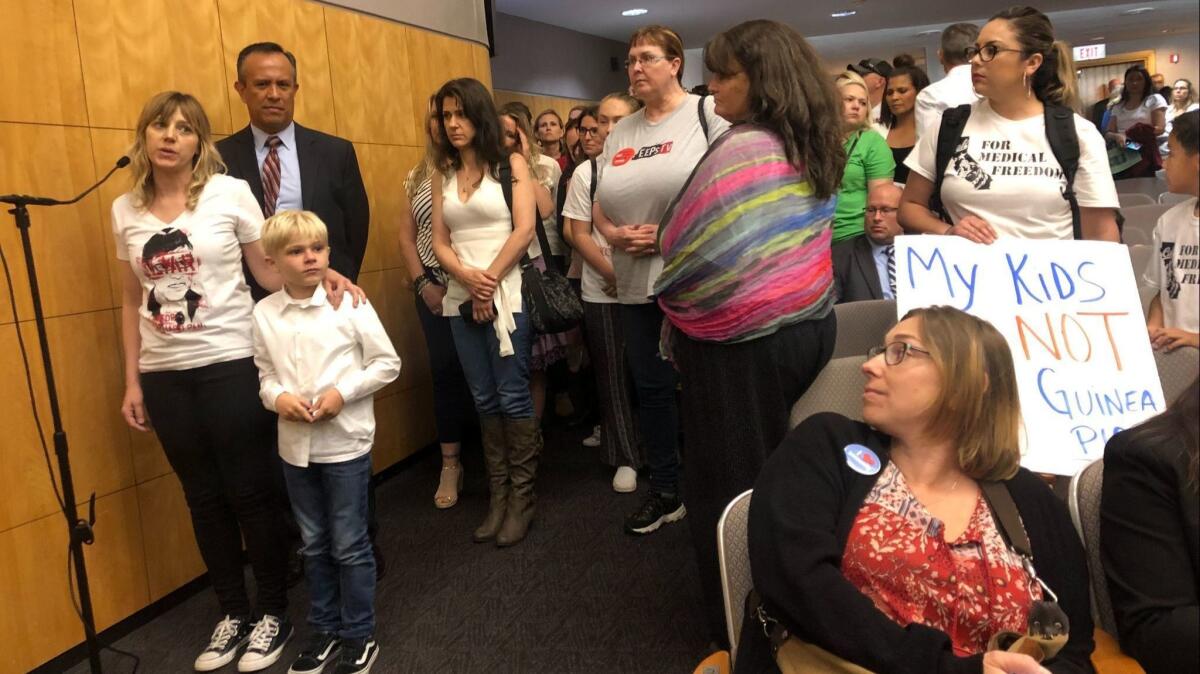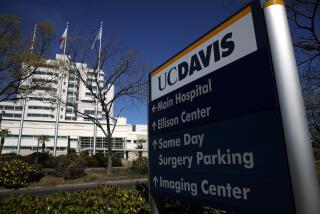Opponents call it a ‘crime against humanity,’ but vaccine bill moves forward

- Share via
Reporting from Sacramento — A contentious bill to tighten California’s school immunization law passed its first hurdle in the Legislature on Wednesday, after hundreds of parents lined the corridors of the state Capitol, alternately pleading and demanding that lawmakers reject it.
The emotional testimony on the bill comes as a measles outbreak has put public health officials on high alert. More than 100 doctors and medical students spoke in favor of Senate Bill 276, which would empower the state health department to vet medical exemptions sought by physicians.
Sen. Richard Pan, a Sacramento physician and Democrat, introduced the legislation, which passed 6 to 2 on Wednesday in the Senate Health Committee. The Capitol hallways were hot and humid amid the mass turnout of mostly opponents, many of whom said their children were injured by vaccines.
One opponent called Pan a “tyrant,” another labeled his bill a “crime against humanity,” while a third urged the senator to abandon the proposal to “save your soul.”
California already has one of the strictest laws in the country requiring childhood immunizations in order to attend public or private schools, with exemptions allowed if a doctor says there is a medical reason to not have all or some shots. Pan said that 2015 law, which he wrote, has been exploited by some doctors, who are excusing children from vaccinations for questionable reasons such as for having asthma or diabetes.
Pan, who is chairman of the committee that heard the bill, stood stoically Wednesday at the front of the hearing room, having witnessed a similar turnout for his 2015 legislation.
Pan said a few unethical physicians who advertise medical exemptions for cash prompted him to propose the bill to create state oversight.
“California cannot allow a handful of unscrupulous physicians to put our children in danger, particularly babies too young to be vaccinated and children who genuinely need a medical exemption,” said Pan, a pediatrician.
The bill calls for all exemptions currently on file at schools to be sent to the public health agency by July 1, 2020, for possible review. The department would also maintain a database of exemptions that would allow officials to monitor which doctors are granting numerous exemptions.
“With these restrictions, this would force us to either take a gamble with our sons or it would put us in the difficult position of pulling my kids from public school,” said Adriane Hoeft of Roseville, who spoke in opposition to the bill.
Hoeft said her 10-year-old son, Otto Coleman, was paralyzed at 17 months old after receiving a series of vaccines. Coleman is able to attend public school with a medical exemption that allows him to skip other vaccines. His 8-year-old brother also has a medical exemption to forgo vaccines.
“This would force us to home-school them,” Hoeft said.
California, West Virginia and Mississippi are the only states that do not allow parents to opt out of vaccinating their children for religious or personal belief reasons. West Virginia requires medical exemptions to be vetted by the public health department.
The push to tighten California’s vaccine law comes amid the worst measles outbreak in the nation in decades. Nationwide, an estimated 695 people have come down with measles as of Wednesday, according to the U.S. Centers for Disease Control and Prevention.
In California, there have been at least 25 measles cases this year, with outbreaks in Los Angeles and Butte counties. During the hearing Wednesday, a third case of measles was confirmed in Sacramento County.
Experts say California may be spared from the giant outbreaks Washington and New York states are experiencing in part because of SB 277, the 2015 law that tightened childhood vaccination requirements.
Federal health officials declared measles eliminated in 2000. But now there are outbreaks, they say, because fewer people are being vaccinated in the U.S. and across the world. Americans are now more likely to encounter measles abroad, and when they return, the infection is more likely to spread here.
In California, travelers from abroad have introduced measles into the state at least 10 times this year, but there have only been three outbreaks. The biggest, in Northern California, has infected 15 people so far, which pales in comparison to the 390 cases confirmed in Brooklyn and Queens in an ongoing New York City outbreak.
Since SB 277 went into effect, California’s kindergarten vaccination rate has increased from 92.9% to 95.1%, according to state data. Doctors say that a community needs at least 95% of its residents to be immunized to prevent measles from spreading.
Pan said in an interview that California needs to bump up its immunity further as outbreaks continue so that measles doesn’t spread here.
“When it comes to these vaccination bills, the facts and the science are on my side, but if that was the only thing you needed, then there would be no problem,” he said. “Clearly we’re going to have to contend with the large number of people who, unfortunately ... are misinformed about vaccines. And that’s in the backdrop of all the measles outbreaks that are happening all around the U.S.”
SB 277 banned parents from not vaccinating their kids because of personal beliefs. It was passed in the aftermath of a major measles outbreak centered on Disneyland. The state’s vaccination rates had fallen in years prior as more and more parents said they did not want to vaccinate their children.
Now, parents must obtain a doctor’s note saying that a child has a medical reason not to be vaccinated, such as an allergy or because they’re undergoing cancer treatment. But since the law was implemented, the number of children with medical exemptions has grown, while physicians have been accused of excusing children from immunizations for questionable reasons.
Doctors say that at most 3% of students may have a medical reason not to be vaccinated. But at 105 elementary schools in the state, 10% or more of kindergartners had a medical exemption in the 2017-18 school year, according to a Los Angeles Times analysis of state data.
Though the overall vaccination rates are higher, schools with low rates are the real problem because there are several kids in one space who aren’t protected against disease, experts say. At some elementary schools, less than 50% of the kindergartners were vaccinated in the 2017-18 school year.
Since the 2015 vaccination law was passed, only one California physician has been sanctioned for fraudulently writing medical exemptions. Orange County-based Dr. Bob Sears was put on probation last year for excusing a 2-year-old from all vaccines.
The Medical Board of California, however, is investigating many more doctors. In addition to the complaint that launched the Sears investigation, more than 50 others have been filed against physicians who are accused of improperly writing exemptions in the last four years, according to the state medical board.
Sears attended Wednesday’s hearing in opposition to the bill, which now heads to the Senate Appropriations Committee.
More to Read
Get the L.A. Times Politics newsletter
Deeply reported insights into legislation, politics and policy from Sacramento, Washington and beyond. In your inbox three times per week.
You may occasionally receive promotional content from the Los Angeles Times.












